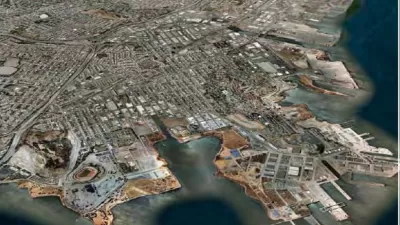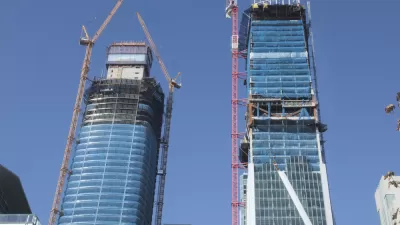With redevelopment funding no longer an option, South San Francisco and other cities increasingly are looking to a community benefits platform, according to Murtaza Baxamusa, a planner and urban planning professor.
The demise of redevelopment has forced cash-strapped cites statewide to come up with more innovative ways to fund projects, with one such strategy involves granting development rights to developers in exchange for providing or funding public benefits.
A fine example of this is South San Francisco, which went through a two-year planning process to come up with a 20-year development plan for downtown that propose 2,400 residential units and 800,000 square feet of commercial and retail space within walking distance of the CalTrain station, writes Murtaza Baxamusa, a planner who develops affordable housing for the San Diego Building Trades Family Housing Corporation and teaches urban planning at the University of Southern California.
Labor, environmental, health, transportation, social justice, and housing organizations in the community came together to give input in the plan, which the South San Francisco City Council adopted earlier this year. While the community benefits approach to planning can be a tough sell in some communities, it’s one that has tremendous value, according to Baxamusa.
”Public accountability for public resources seems like common sense, but is often under attack. This is because a community benefits approach threatens the dominant paradigm in many cities: that of value-free growth (i.e. any development is good). However, a conditional acceptance of growth is not anti-growth, but an affirmation of value-added growth (i.e. any development ought to be good). It expresses astute stewardship of public resources by an educated public that recognizes the economic trade-offs between growth and stagnation, externalization and internalization of costs and benefits, and rent-seeking landlords.”
Other cities are taking notice. Redwood City, San Diego, Menlo Park, and Berkeley all have a growing community benefits movement, he writes.
FULL STORY: How Communities can Benefit from Private Development in California

Planetizen Federal Action Tracker
A weekly monitor of how Trump’s orders and actions are impacting planners and planning in America.

Restaurant Patios Were a Pandemic Win — Why Were They so Hard to Keep?
Social distancing requirements and changes in travel patterns prompted cities to pilot new uses for street and sidewalk space. Then it got complicated.

Map: Where Senate Republicans Want to Sell Your Public Lands
For public land advocates, the Senate Republicans’ proposal to sell millions of acres of public land in the West is “the biggest fight of their careers.”

Maui's Vacation Rental Debate Turns Ugly
Verbal attacks, misinformation campaigns and fistfights plague a high-stakes debate to convert thousands of vacation rentals into long-term housing.

San Francisco Suspends Traffic Calming Amidst Record Deaths
Citing “a challenging fiscal landscape,” the city will cease the program on the heels of 42 traffic deaths, including 24 pedestrians.

California Homeless Arrests, Citations Spike After Ruling
An investigation reveals that anti-homeless actions increased up to 500% after Grants Pass v. Johnson — even in cities claiming no policy change.
Urban Design for Planners 1: Software Tools
This six-course series explores essential urban design concepts using open source software and equips planners with the tools they need to participate fully in the urban design process.
Planning for Universal Design
Learn the tools for implementing Universal Design in planning regulations.
Heyer Gruel & Associates PA
JM Goldson LLC
Custer County Colorado
City of Camden Redevelopment Agency
City of Astoria
Transportation Research & Education Center (TREC) at Portland State University
Camden Redevelopment Agency
City of Claremont
Municipality of Princeton (NJ)





























